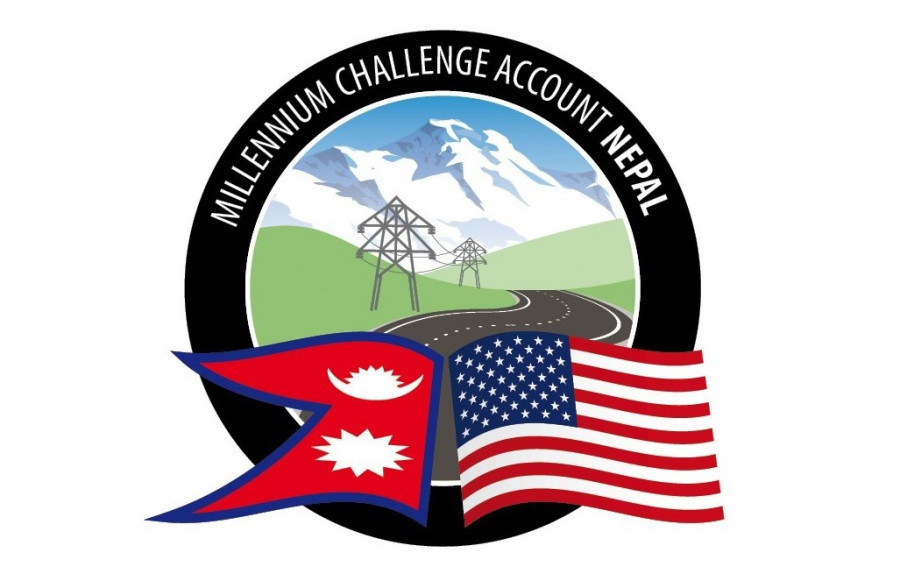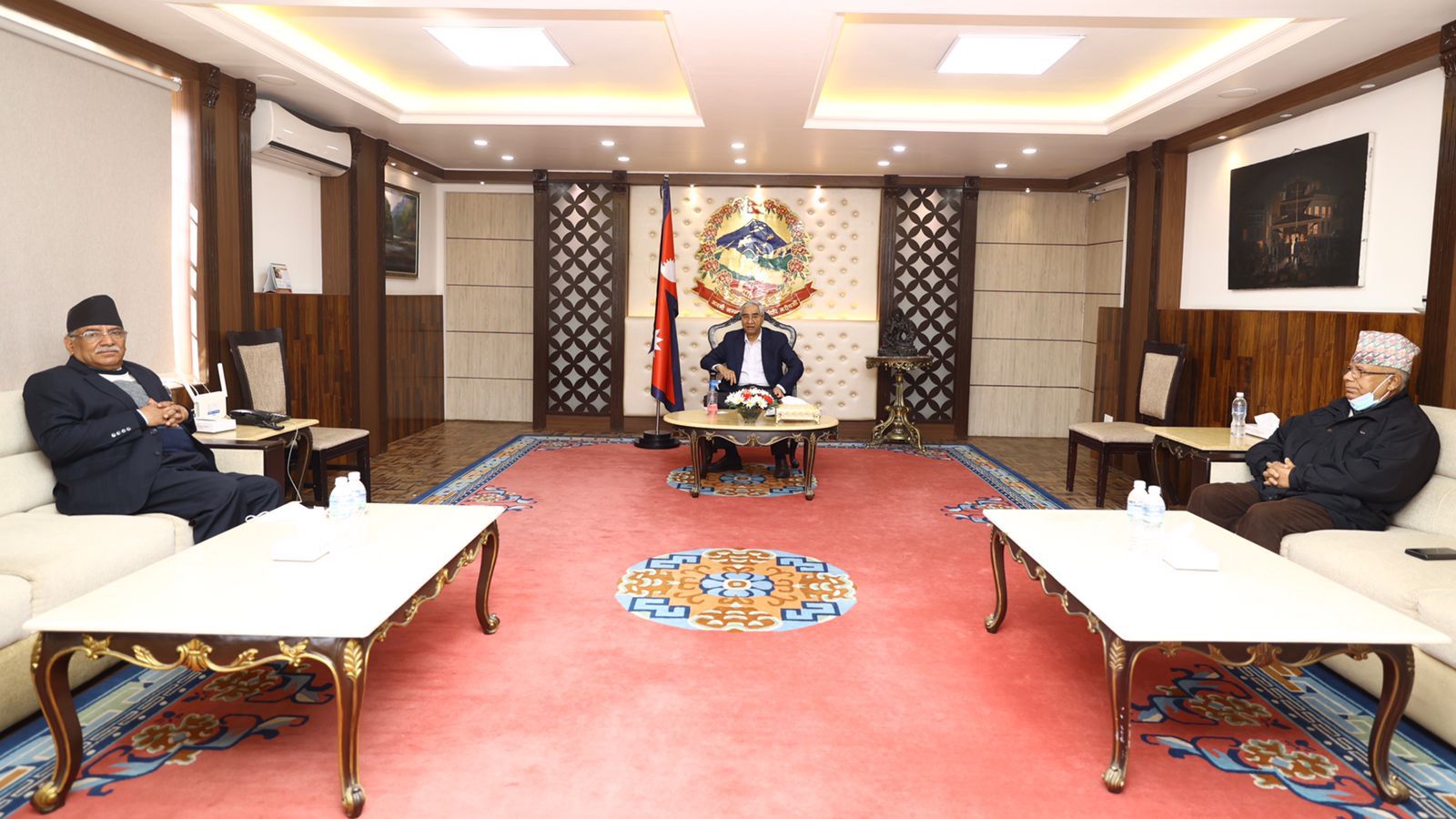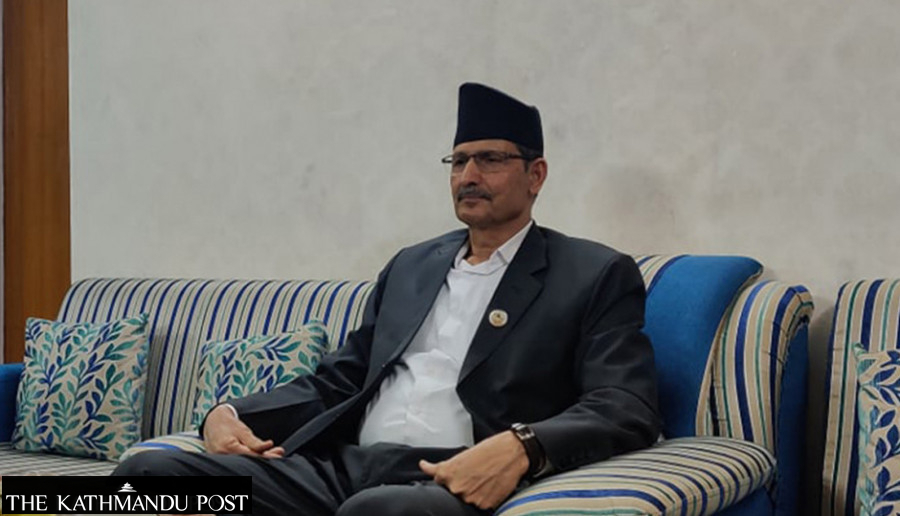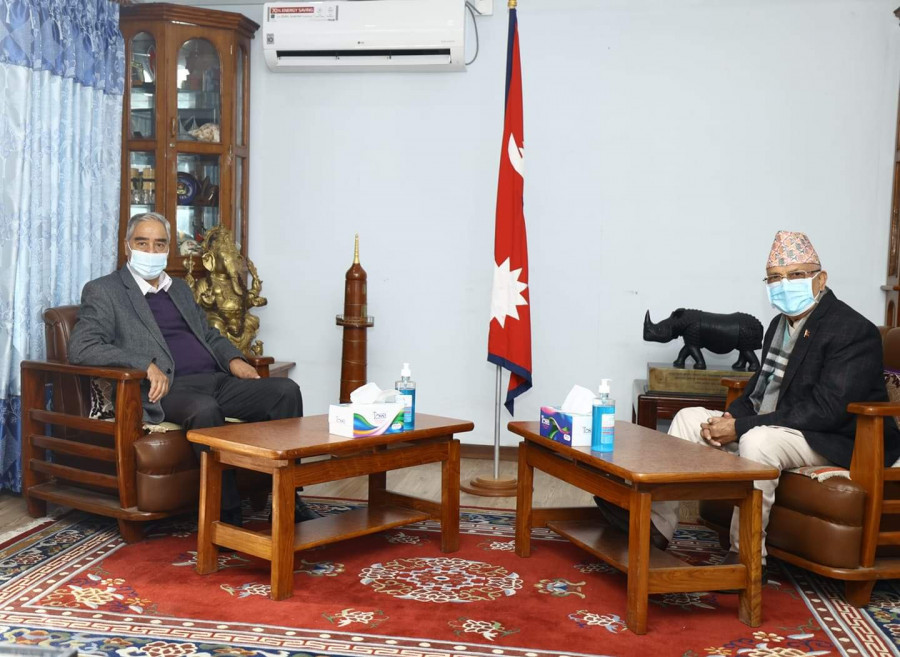National
Government set to table MCC compact in House today, but confusion remains
Congress, the key ruling party, says the Speaker has given word on tabling of the grant. Ratification may take longer though depending on how politics unfolds.
Anil Giri & Binod Ghimire
The key ruling party, Nepali Congress, is confident that the Millennium Challenge Corporation-Nepal Compact will be tabled in the House on Wednesday.
After multiple deferrals following differences over the MCC compact, a $500 million American grant, a House meeting has been scheduled for Wednesday.
At the Nepali Congress Parliamentary Party meeting on Tuesday, Prime Minister and party president Sher Bahadur Deuba said that he has already spoken with Speaker Agni Sapkota for the tabling of the compact.
“We [the Congress party] have already requested Speaker Sapkota. He has committed to allow tabling of the compact in the House tomorrow,” said Prakash Sharan Mahat, spokesperson for the Nepali Congress.
Sapkota, who was elected to the post of Speaker from the Maoist party, was earlier seen as someone who could block the government’s move to table the American compact in the House.
The Communist Party of Nepal (Maoist Centre) and the CPN (Unified Socialist), two key coalition partners in the Deuba government, have maintained that they are opposed to the compact’s ratification without amendments to some of the provisions, but sources say they have reached an understanding with the prime minister to allow the tabling of the compact.

The main opposition CPN-UML, however, has not made its position clear on the MCC compact. Nor has it said anything about the government plan to table it on Wednesday.
It, however, has objected to Monday’s impeachment motion against Chief Justice Cholendra Shumsher Rana by the Congress, Maoist Centre and the CPN (Unified Socialist), saying the move is aimed at sabotaging the local elections and ratifying the MCC compact. The UML has been obstructing the House meetings for the last five months and has said it would continue to do so—on Wednesday as well.
Though Congress leaders said they are “very confident” that the compact will be tabled Wednesday, none has said anything on its ratification.
Since Prime Minister Deuba has publicly said that he has already spoken with Sapkota, it will most likely be tabled at Wednesday’s meeting.
Observers say Sapkota’s role will be crucial both in the tabling and ratification of the compact.
The Parliament Secretariat on Tuesday issued a “tentative agenda” for Wednesday's House meeting which, however, doesn’t include the MCC compact.
Mahat, the Congress spokesperson, said it will be included in the final list of the agenda before the House meeting.
Sapkota has called a meeting of the Business Advisory Committee at 11:30am on Wednesday to finalise the agenda for the day.
The 16-member committee led by the Speaker has Minister for Law Dilendra Badu and lawmakers from major parties as members.
Along with Badu, Minister for Home Affairs Balkrishna Khand and Pushpa Bhusal, are members from the Congress. Bishal Bhattarai, Shanta Chaudhary and Khagaraj Adhikari are members from the UML.
Dev Gurung, Jayapuri Gharti and Rekha Sharma represent the Maoist Centre in the committee.
Jeevan Ram Shrestha of the CPN (Unified Socialist), Pradip Kumar Yadav from the Janata Samajbadi Party, and Laxman Lal Karna from the Loktantrik Samajbadi Party are also members of the committee.
“The Parliament Secretariat is still undecided about the MCC compact. The Business Advisory Committee will take a decision on the matter,” Gopal Nath Yogi, secretary at the Parliament Secretariat, told the Post.

All members of the committee from the Maoist Centre and the CPN (Unified Socialist) are opposed to the idea of tabling the MCC compact in the present form, at least in their public statements so far.
“We have a consistent position that it cannot be tabled in the present form,” Sharma from the Maoist Centre told the Post. “Our Parliamentary Party meeting has been called prior to the Business Advisory Committee meeting. A decision on the matter can come by tomorrow morning.”
According to Yogi, if the MCC compact is tabled on Wednesday, the lawmakers will get 120 hours, or five days, to register their amendment proposals.
If the process moves ahead smoothly, it can be tabled for voting only on Monday.
The Speaker will first table the amendment proposals to a vote followed by the MCC compact.
As the party representatives in the Business Advisory Committee are divided, it will be up to the Speaker whether to include the MCC compact on the House agenda and proceed with the endorsement process.
“The Speaker has the discretionary power to finalise the agenda and move it for the endorsement,” Som Bahadur Thapa, a former secretary at the Parliament Secretariat, told the Post. “Sapkota so far has been reluctant. However, as the government has openly said the compact will be tabled at Wednesday's meeting, it will be difficult for him to stop now. It is his responsibility to facilitate the tabling of the government’s bill and motion.”
An official at the Parliament Secretariat said if the number of amendments on the MCC compact are high, it could be sent to the International Relations Committee to build consensus.
Any amendment, however, won’t be applicable, as MCC has already ruled it out multiple times.
But the ratification process will certainly get delayed if the amendment proposals are sent to the parliamentary committee for further discussions “for building consensus”, say officials at the Parliament Secretariat.
The MCC compact can be put to a vote only after the committee submits its report, after discussing the amendment proposals, before the full House, according to them.
Generally such compacts are endorsed through a “voice vote” where the lawmakers say “yes” if they stand in favour and say “no” if they are against.
“There is a practice of endorsing the bills and other government proposals through a voice vote,” said Yogi.
Multiple Congress leaders the Post spoke to said that they can say confidently that the MCC compact will be tabled in the House at Wednesday’s meeting and that and as far as ratification is concerned, they will have to see how the situation unfolds in the coming days.

The UML’s position also has riled the Congress as it believes the former should have played a supportive role since a government led by its chairman KP Sharma Oli had registered the compact in Parliament on July 15, 2019.
Signed in September 2017, the compact’s ratification will mean Nepal will receive $500 million from the United States in grants to build electricity transmission lines and improve roads.
Continued delays in its ratification due to differences among Nepali parties, however, have left Washington frustrated, which then started building pressure on Nepal’s leadership. After the United States set a February 28 deadline for its ratification, as per Nepali leaders’ letter seeking four-five months, Prime Minister Deuba came under intense pressure. The US said failure to ratify the compact by the timeframe demanded by the Nepali leadership could lead to an end of Nepal’s partnership with the MCC.
Congress leaders say Deuba has not received any word from the UML on its support to the compact ratification yet, but he is in talks with Oli.
“Deuba has also expressed his displeasure with Oli for blowing the judiciary issue out of proportion,” said a senior Congress leader. “Oli has assured of a positive response.”
The general understanding among Congress leaders is that tabling of the compact in the House on Wednesday is key, as there will be at least a gap of five days before it is put to a vote.
“Five days will be enough for negotiations among parties,” said a Congress office bearer. “Our maximum effort will be on building a broader consensus and bringing all sides, including the UML, on board.”
Gagan Thapa, Congress general secretary, said that the Nepali Congress’ position on the MCC compact has been consistent since it was signed.
“The party is committed to its position,” said Thapa. “We had decided to ratify the compact; we will abide by our commitment.”




 13.12°C Kathmandu
13.12°C Kathmandu















